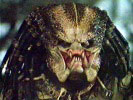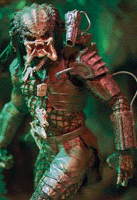
Remote ancestors of the Yautja were probably not the dominant species of their planet (like humans or wolves). But at some time, their immediate ancestor emerged, more intelligent, better adapted to hunting and cooperative hunting techniques. As with most evolutionary tales, several species of Yautja may have developed over the centuries. Eventually, the current species became the world's dominant predator.

Natural/Sensory Abilities:
- Thermographic vision to 2000'. See the invisible through thermographic vision.
- In Predator 2, when the Yuatja loses his mask his vision, it is not like the first Yuatja we encountered in respects to his vision does not go completely red. Vision is always different for different people. Maybe this Yautja was slightly colorblind, or being a slightly different clan (like humans have Caucasians and Asians) gives him different vision.
- They breathe 1% more oxygen, and 4% more nitrogen than humans. They can adapt to earth's natural gases, but it could only last for one week at the most. If Dr. Bergstrom is correct on her theory (Predator: Homeworld), this could be because this is what the atmosphere was like on Earth millions of years ago.
- They can hold their breath for several minutes.
- Can jump to three times their height, and can fall ten times their height and land on their feet.
- Predators can imitate the speech/sounds of other species, but do not necessarily understand the meaning of what they say. They often imitate voices of the species they are hunting to fool or terrify their prey. They do pick up languages quickly, however without formally studying the language as a secondary skill.
- They can hear a whisper up to 50 feet away.
- Impervious to heat (boiling water gets uncomfortable after five minutes), invulnerable to electricity and to radiation.
- They are fast enough to dodge bullets, if they see them coming and can, because of their tough hides, shrug off most small-caliber bullets.
- They have no use for magic, and find it disdainful. Only cowards would resort to parlor tricks.
- Chances of a psionic Yautja are rare, but those that exist are unbelievably powerful, so much that they will not hunt with normal Yautja. A telepathic Yautja, DNA-modified by the Dominators into a meta-Yautja, fought alongside other "meta-Yautja". They hunted only the meta humans of the JLA.
Life Spans
One of the most pronounced differences between humans and Yautja is longevity, sometimes as long as 1000 years. It is unknown what effects this has to a Yautja, especially mentally, once they attain such an elevated age. There may be a specter of dementia. Thus, their bodies would become masses of writhing tumors or the mere containers of inoperative brains.
The Yautja that have seen to have lived to 1000 years appeared not to be suffering any ill-effects.

Physiology

- The Yautja are larger and taller than adult humans, standing at least seven feet (2-2.5 meters) tall but often much taller. Females, seen only by Witchblade and Darkness (AvP vs Witchblade/Darkness), are even larger (and stronger). The female Yautja are known occasionally to throw their mates during moments of passion.
- An average Yautja weighs between 250-350 lb, most of this is pure muscle. The Yautja have very little body fat due to their predatory lifestyle and diet.
- Children are smaller versions of the adult, and a male will typically father 70 or more "suckers" in his lifetime.
- Like humans, they have two arms, two legs, and two eyes. Eye color is usually green or yellow.
- They have long black claws, four clawed toes, thick skulls, broad shoulders, and large biceps. Their back is mostly bone.
- Their mouths have four mandibles around them, much like a set of lips. Vertical slits of its mouth open wide to reveal inner teeth. These mandibles are used for communicating much like a cat uses its tail to communicate its mood.
- They give off a musk other Yautja, and canines, can detect - but humans cannot. When canines sense them, they usually constantly whine, heads down, or else store out and make unhappy noises in their throats. Yautja's scent for aggression is an oily, bitter smell.
- As far as environment, it appears that the Yautja prefer hot, humid conditions with an atmosphere rich in nitrogen. "Not only could they press up against metal heated to 120 degrees Celsius without being burned ... they seemed to relish the heat." (Predator: Cold War TPB)
- Yautja have reptilian skin of mottled red, green and yellow patterns.
- Their blood is a dark phosphor green, possibly due to different oxygen carriers in their hemoglobins. While humans use iron to perform the actual task of binding the oxygen molecule, the Yautja may be using copper or something similar to it.
- Their blood neutralizes Hard Meat's blood's caustic effects (to a degree). It is also carbon-based (Batman vs Predator), which supports Dr. Bergstrom's theory that they originated from Earth (Predator: Homeworld).
- Yautja have long hair that is braided into dreadlocks in an extremely painful ritual taking months to perform.


- Perhaps one of the most pronounced differences is longevity. Subotai, a former Japanese samurai, has been fighting Yautja for over a thousand years. (He has lived that long because he has eaten Yautja flesh.) Subotai has had the same Yautja opponent for all those centuries.
- Similarly, Li Yat Sen (aka Gideon Lee) had stayed young since 1320 by eating Yautja flesh.

Are the Yautja Shape Shifters?
 Terrestrial animals exhibit some flexibility in their shape and color.
Terrestrial animals exhibit some flexibility in their shape and color.
- Puffer Fish can swell their bodies to several times their normal volume, making them look too big to eat to their enemies.
- Several insects fade into the background by virtue of the fact that they look like tree branches or leaves.
- Some insects go through a complete revamping, known as metamorphosis, morphing from larva to pupa to adult.
- Mammalian figures during birth.
- Snakes can unhinge their bones at the cartilage joints.
- Chameleons, small lizards commonly found in Africa and Asia, have the unique ability to change the color of their skin as means of better blending in wit the background, thus avoiding the hungry eyes of potential predators. Their skin contains three layers of pigment cells. Each layer corresponds to a primary color: red, green, and blue. Any color can be generated by combining various intensities of red, green, and blue light. By expanding and contracting various cells in these layers, the chameleon can produce any skin color it desires.
In reading the novelization of the movie, Predator, this gives the suggestion that the Yautja was indeed some form of shape-shifter.
"It somehow discerned living tissue from inanimate objects by picking up heat patterns of living cells. It saw the outlines of all living creatures shaded with a sort of liquid color that was the pulse of the heat of life. But 'saw' is very imprecise, for it only had eyes when it felt like having eyes. It was like a lost soul searching for a form in which to flower."
"Since it needed no earthly form of its own beyond what it chose to assume, it was incapable of feeling emotion toward any of the earthling tribes."
"It was impossible to say to look, whether monkey or crow or something more mutant. If one of the men had looked straight into the leaves with binoculars, he might have caught the yellow gleam of an eye, but the eye was only a nexus of nerves, spun from its own secretions like an insect's nest."
"It quickly searched the surrounding sky till it settled on a hawk sailing gracefully by, its wings held perfectly still while the heat-soaked air currents wafted it like a billowing schooner. The unearthly intruder followed the bird's flight with its heat vision. Then, with its sixth sense power of capture, it zeroed in on the hawk's presence, it's mind steering the bird toward it like some remote-controlled toy."

Evolution
Evolution - General
The path of evolution is not linear. It depends on planet specifics (gravity, atmosphere composition, temperature, length of day) and random astrological/geological events (e.g., star age, large meteor impacts, ice ages).
40,000 years ago, modern humans first appeared. There are ties between them and earlier ancestors. The world was different in terms of the environment and of animals that roamed the planet. There were even other kinds of humans living concurrently, if not in proximity to modern human ancestors. Another 30,000 years hence and they had completely covered the globe - and all remaining proto-humans were gone, (along with several other animal species). Yet since the arrival of modern humans, we are in essence the same humans that wandered the earth 40,000 years ago. All the basic drives - instincts - are still with us. Even though we have the capacity for change, physical evolution is at a standstill. The aspects of nature that produces change have been mitigated or eliminated in human culture.
Evolution - Yautja

Yautja evolved as the dominant carnivorous species on their world. Covered mostly with extremes of sweltering swamps and burning deserts, the average temperature runs between 190 degrees Fahrenheit! As with most species, their society was forged in the heat of wars that lasted for eons. They fought mostly for the hunting rights of a region, and only the strong survived.
Eventually, as the wars subsided due to attrition, their species settled on one final way to establish dominance: Competition and the Hunt. Individual combat always took place as a hand to hand event, wearing only a loincloth, and relying only on personal strength. When they were finally contacted by another species, hoping to settle on a little used continent far from the Yautja; the response was more than easy to predict. Several landing craft set down, and returned to the mother-ship, loaded with irate hunters. They defeated the would-be colonists easily, and took to the stars.
"Different predators require responses, you know. With some, you must stand your ground, or they perceive you as prey. While with others, confronting them is seen as a challenge."(Dr. Bergstrom, Predator: Homeworld #2)

Origins
Dr. Bergstrom theorized that the Yautja encountered in Yellowstone (1999) was on a pilgrimage to Earth, to return to its roots, to their spawning grounds, following some homing instinct across space. There are so many gaps on the evolutionary chart. Creatures that apparently disappeared virtually overnight. Her theory was that these creatures were from Earth's distant past, evolving from some ancestor, a proto-mammal or some such. They had escaped the mass extinction other races had succumbed to.
Maybe they did evolve here. The mountains were once full of the biggest game there is (dinosaurs, etc.). They could have survived, and having run out of challengers, moved on. Conditions were different where they went. Somebody once speculated that if crocodiles had better circulation, they would be dragons.
Migratory animals use magnetic fields to navigate. Perhaps there is some kind of conductivity in space. Perhaps their ships pick it up. This is why it's a rare privilege to return. Normally one like the tattooed Yautja would be allowed, but not the Bad Bloods.
